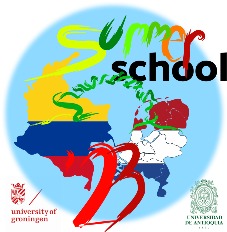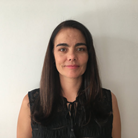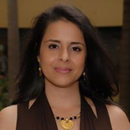Planetary Health - Epidemiology meets technology

This summer school is jointly organized by the faculties of Medical Sciences and Public Health of the University of Antioquia, and by Campus Fryslan, UMCG and the Aletta Jacobs School of Public Health in Groningen.
Planetary Health is a relatively new transdisciplinary field that recognizes that human health and the health of our planet are inextricably linked. According to the Planetary Health Alliance - a consortium including more than three hundred universities - it focuses on "analyzing and addressing the impacts of human disruptions to Earth's natural systems on human health and all life on Earth."
Within that context, the purpose of the Groningen-UdeA Summer School is to collectively reflect on the complexity of the world we live in, and in particular, the complexity of the relationship between environment, health, and societal inequalities. These questions will be addressed with a particular focus on how technologies and eHealth can be used as a tool to overcome the growing gap in inequalities.
Among other things, students will learn about:
-
An introduction to Planetary health
-
Exposure assessment and molecular epidemiology
-
Experiences from around the world
-
Cultural acceptability and between/within comparisons
-
eHealth & citizen science
|
Dates & location
|
10 - 22 July 2023 |
|
Fee
|
First week
2% of the GDP according to the country of origin of the student. Fees will be capped at €400 to avoid unrealistic values.
Second week
Includes:
Does not include: Accommodation is not included and must be arranged by the participants. Contact has been made with the following hotels which offered the following fees for the participants of the summer school:
*Per night, including breakfast, excluding city tax. All rates are subject to change based on Hotels availability and time of reservation. We invite participants to make their reservations as soon as possible. Those interested in booking accommodation at the WTC, should go to the website and follow the instructions:
- Fill in the arrival & departure date (between the 8th and 22nd of July) and fill in the right amount of persons - At promo code, fill in: 120423WTC - Choose a room type and continue - Choose the rate €119,50 per night. Participants are of course welcomed to look for other accommodations inside Leeuwaarden (Netherlands) There is a possibility to apply for a scholarship for this summer school. Please check the requirements here. |
|
Academic coordinator
|
Valentina Gallo. M.D, Ph.D. Associate Professor in Epidemiology and Sustainable Health. Director of the Department of Sustainable Health. Campus Fryslan. University of Groningen
Ysabel Polanco López de Mesa. M.D, Ph.D. Teacher from the department of preventive medicine and public health. Faculty of medicine. University of Antioquia.
|
|
Contact
|
Dr Valentina Gallo (Director of the Department of Sustainable Health) |
This summer school is designed for advanced bachelor students and/or graduate students in a field of interest for planetary health with some knowledge and experience of quantitative and /or qualitative research methods used in epidemiology and medical science and willing to work in an interdisciplinary way with colleagues from different backgrounds.
It is expected that the participants have a sufficient command of the English language to actively participate in the discussions and to present their own work in English.
After this course you will be able to:
-
Describe the main concepts underlying Planetary Health, the main drivers of human pollutions, and the main human health consequences of climate change
-
Discuss the role of molecular epidemiology and measurement of the exposome in Planetary Health
-
Appreciate the importance of cultural norms in driving exposures and acceptability of assessment
-
Explore the potential for new technologies in Planetary health, from exposure assessment, to remote connection & telemedicine
-
Work interdisciplinary with a group of peers on a research task relevant to Planetary Health
-
Liaise with the local community and local stakeholders to have a sense of cultural norms, socio-economic drivers and political stand of the country you are in, in relation to Planetary Health
Workload
The workload accumulated consists of:
Independent work: 20 hours
Lectures: 30 hours
Group activities: 30 hours
Field trips: 20 hours

Valentina Gallo
Valentina Gallo is a Rosalind Franklin Fellow and Associate Professor in Epidemiology and Sustainable Health at Campus Fryslân, University of Groningen where she leads the Sustainable Health flagship. She trained in Medicine and Surgery first and Clinical Neurology after. Valentina gained her PhD in Clinical and Experimental Neurology. Valentina’s research is focused on the epidemiology of neurological disease, molecular and environmental epidemiology. In April 2020 Valentina moved to Groningen and started as Associate Professor and leader of the Sustainable Health Flagship at Campus Fryslân.

dr. Esther I Metting
Esther is a psychologist and epidemiologist, currently working as assistant professor at the University of Groningen. Her dissertation was titled “Development of patient centered management of asthma and COPD in primary care” with a strong emphasis on the use of technology and patient involvement. Her experience in clinical, behavioural and implementation science have led to a solid and multidisciplinary basis for health research. In her role as project leader and chair I have learned to manage longitudinal (international) projects with researchers, health care professionals and students. Her goal is to improve scientific knowledge in the field of eHealth.

Ysabel Polanco
Ysabel Polanco is an associate professor in the department of public health and preventive medicine, School of Medicine. University of Antioquia, Colombia. She received her medical education at the University of Antioquia. She studied masters in medical anthropology at the University of Florida and a PhD in Public health at the University of Florida (USA). She currently performs research mainly related to environmental health, particularly the health effects of pesticide use in Colombia.

Paula Andrea Diaz Valencia
Paula is MD, MPH, PhD, and currently works at Postgraduate programs and PhD Epidemiology Program at the National School of Public Health in the University of Antioquia. She was President (2018-2020) and currently member of the Americas Network for Chronic Disease Surveillance. She does research in chronic diseases and metabolic disorders with particular interest in epidemiology of diabetes and health education for patients with diabetes.

Eliana Martinez Herrera
Eliana works as professor in the University of Antioquia. She is a public health specialist and epidemiologist with a PhD in the same field. She is a specialist in planning and administration of international cooperation towards development. With expertise in the building of knowledge networks, public health policies, social network, social capital, social technologies for health, health promotion, disease prevention, health equitativity and climate change.
In this summer school you will learn about:
-
Introduction to Planetary health
-
Exposure assessment and molecular epidemiology
-
Experiences from around the world
-
Cultural acceptability and between/within comparisons
-
eHealth & citizen science
The summer school is 2 weeks long and will run in parallel in Groningen (the Netherlands) and Medellin (Colombia)
Week 1:
The first week is hybrid and can be joined either from Groningen, or from Medellin, or online. It will introduce the students to the complexity and the concept of Planetary Health with a specific focus of the application of technology. The program includes 4 hours of lectures per day in a shared virtual room. Collective hybrid reflection sessions of 2 hours per day will be held in each location.
Week 2:
The second week is in person only and can be joined either from Groningen, or from Medellin. Students will be split into interdisciplinary groups depending on their background and their preferences expressed during the application process and will engage into a mini-local research activity.
To apply, kindly fill out the online application form. Please include the following documents with your application:
-
CV
-
Letter of motivation
-
Letter of recommendation
The application deadine was 31st of May 2023. Only those who wish to participate solely in the first online week can still apply. After application a selection committee conformed by members of the two universities will review applications and select the participants. An email will be sent to participants with the decision and further steps.
-
Participants who cancel more than 4 weeks before the start of the course are liable to pay 15% of the full course fee, unless the Summer School in question decides otherwise.
-
Participants who cancel within 4 weeks before the start of the course are liable to pay the full course fee, unless the Summer School in question decides otherwise.
-
Participants who withdraw during the course are liable to pay the full course fee, unless the Summer School in question decides otherwise.


| Last modified: | 09 June 2023 3.29 p.m. |
